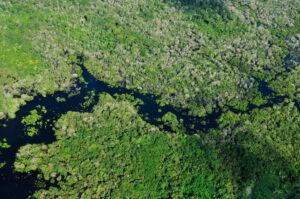Organizations and Movements Defend Brazilian Forests from Carbon Offsets
Below is a statement from the Small Producers Movement (MPA), asserting that proposed carbon markets are a false solution to climate change that would aggravate the climate crisis. Grassroots International partners the Landless Workers Movement (MST) and the Movement of People Affected by Dams also signed onto the statement, which appeared on the MST’s website and is reposted with permission.
More than 50 Brazilian organizations and social movements working on issues related to the environment, human rights, workers’ rights, indigenous peoples and traditional peoples and communities have filed a “Letter in defense of the historic position of Brazil on forest offsets” with the Ministry of Environment and the Ministry of Foreign Affairs. It is in reaction to an attempt to enable the use of forests in offsets, a measure seen as a false solution to the challenge of climate change.
“Some actors have used the Paris Accord implementation negotiations, the political crisis and the economic turbulence that the country and the world are going through, as a pretext to demand measures in favor of offsets,” say the organizations. According to them, the effort would benefit those who continue to emit greenhouse gases or receive resources, but would have serious consequences for Brazil and the world.
In the letter, they point out eight reasons to consider the forest offsets to be a measure that would only aggravate the climate crisis. Among the arguments is the false equivalence between carbon emitted by fossil fuels and carbon captured by the trees, deepening inequalities, and the fact that compensation via offsets would generate incentives for countries to hold back on their UN goals of emissions reduction.
The ability of trees and ecosystems to remove and fix carbon from the atmosphere is much slower than the rate of emissions when fossil fuels are burned, and carbon which accumulates in forests is vulnerable to deforestation and burning.
With this, the signatories defend the historical position of Brazil of not considering deforestation reduction, conservation and forest recovery projects that are eligible for carbon credits.
“We cannot divert attention from the real solutions and policies needed to cope with the climate crisis,” they say.
Read the full letter:
Letter in defense of Brazil’s historical position on forest offsets
Throughout the 23 years of existence of the United Nations Framework Convention on Climate Change, many proposals have emerged as solutions to the climate crisis. The inclusion of forests in offsets is one of these. Since the first proposals on this topic were presented, numerous organizations and social movements, NGOs, representatives of indigenous peoples, traditional peoples and communities in Brazil and around the world have raised concerns and have denounced what they agree is a false solution to the crisis of the climate.
In the current context of international negotiations and in the national context, actors have used the Paris Accord implementation negotiations, the political crisis and the economic turbulence that the country and the world are going through, as a pretext to demand measures in favor of offsets. The signatory organizations of this letter see such propositions with concern and defend the continuation of Brazil’s historical position against forest offsets, agreeing that any change would jeopardize the environmental integrity of the country and the planet, as well as jeopardizing the agreement to comply with the historical responsibilities by developed countries, and the architecture of the Paris Agreement.

Why are forest offsets a false solution?
1. They present a false equivalence between the carbon from fossil fuels, which is accumulated under the earth, and the carbon that is accumulated by the forests. The ability of trees and ecosystems to remove and fix carbon from the atmosphere is much slower than the rate of emissions when fossil fuels are burned, and carbon which accumulates in forests is vulnerable to deforestation and burning.

2. They serve as an incentive for countries hold back on their ambitions. The Paris Accord is based on voluntary national commitments determined by each government, and only emission cuts that go beyond these commitments could be marketed in offsets markets. With offsets, the lower the national commitments, the more it would have to sell, creating a stimulus for low ambition.
3. They do not bring additional benefit to reducing emissions because it is a zero-sum game. They are never effective reductions, because what is there is compensation. What is reduced by the non-emission of forest continues to be emitted in another sector.
4. It transfers responsibility from the sectors that contributed to the climate crisis to those who have always protected forests: indigenous peoples, traditional populations, family farmers and peasants.
5. It deepens and generates new forms of inequality, since those who have money and power can pay and continue emitting without doing their part. The polluter-pays concept, initially created to pressure countries and sectors to reduce their pollution, is captured by those who can continue to pollute as long as they pay for it.
The polluter-pays concept, initially created to pressure countries and sectors to reduce their pollution, is captured by those who can continue to pollute as long as they pay for it.
6. It mortgages the forests to meet the debts of the sale of emission reduction credits. To this end, decades-long commitments are made, also involving the mortgaging of the future of thousands of people who will be born without the State, and the peoples in their territories can have the sovereignty over which policy and actions can be created for the protection and use of their common goods.
7. It makes room for governments and other actors to focus on discussions of reducing the burning of fossil fuels, which account for about 70% of global greenhouse gas emissions – and still continue on a growth trajectory.
8. It takes the focus away from confronting the real problems facing the national forest, promoted by interest groups that want to weaken forest protection policies in the country, and still feeds the discourse of those who want to undermine Brazilian environmental legislation.
Internationally, for at least two decades Brazil has negotiated to reject the inclusion of forests as a mechanism to compensate the emissions of greenhouse gases released into the atmosphere by sectors such as energy and transportation.
At the national level, we see a setback of laws and policies that guarantee the protection of territorial rights and the environment. In the midst of this crisis and offensive, there is a return to a discourse saying that the purchase and sale of forest carbon would be a solution for coping with growing deforestation and for capturing and receiving the necessary resources for monitoring and monitoring. This is coupled with efforts to reconfigure the National Commission for REDD + (CONAREDD +) and the Amazon Fund so that they would also open space for offsets. As much as the speech sounds attractive, the arguments above show that it is a defense of a false solution, aimed at benefiting a small group of actors (those who would continue to emit greenhouse gases or receive resources), but would have serious consequences for Brazil and the world.
We cannot divert attention from the real solutions and policies needed to tackle the climate crisis.
Therefore, we demand the maintenance of Brazil’s historical positioning against forest offsets.
